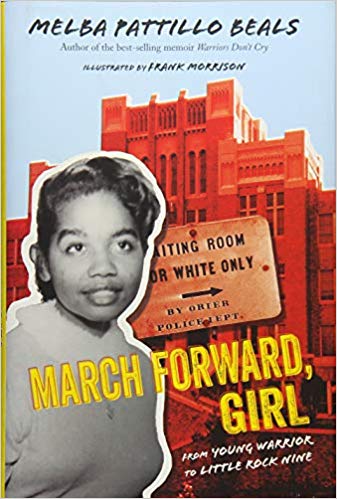In my effort to review a range of middle-grade books, this week I bring you a non-fiction story. March Forward, Girl (Houghton Mifflin Harcourt) is a memoir by Melba Pattillo Beals.
Beals is one of the Little Rock Nine, a group of nine African-American children who were the first to attend the formerly all-white Central High School in Little Rock, Ark., in the wake of the 1954 Brown v Board of Education decision. The resistance to integration in that community was so virulent that President Eisenhower sent an armed unit from the 101st Airborne Division to escort Beals and her classmates into the school.
But this event is mentioned only at the end of March Forward, Girl. The power of this memoir comes in the ordinary, daily details of Beals’s life prior to this historic event.
As a pre-schooler, Beals spent evenings doing puzzles, learning the alphabet and her multiplication tables, and reading. She listened to classical music while sitting on her father’s knee on their green velvet chair. She describes bath time, story time and family dinners. We learn about what food they ate. We see her mother studying at the kitchen table to earn her master’s degree after working all day as a librarian at Baptist College. Beals’s family lived in a four-bedroom house and went to church several times a week.
In short, they led a solidly middle-class life.
Which means when Beals describes the humiliation of being treated as second-class citizens, its impact is extra strong. I thought I knew about how poorly African-Americans were treated in the Jim Crow South, but there is nothing like hearing it from someone who lived it to really sicken you.
When Beals’s family went shopping, whether for groceries or in a department store, they were not allowed to touch any merchandise. If they wanted clothing they could not try it on. And returning an item was out of the question. Beals describes how she and her grandmother had to step back every time a white person came in to pay or get waited on. Clerks wouldn’t handle their money except with a handkerchief. The one time Beals tried to use the “whites-only” bathroom in a department store, the police were called and they questioned Beals and her grandmother for hours. They narrowly escaped being thrown in jail.
Even in their own community, Beals and her family and neighbors were not safe. And it was here that the violence is unspeakable. A house in her neighborhood was burned down and all six members of the family, including two toddlers, were lynched in the yard. Once the KKK came to their church, locked everyone in, and lynched one of their neighbors before their very eyes. No one could do anything. Beals was five years old.
It’s hard to imagine surviving a childhood like this, but Beals —and the others in the Little Rock Nine — persisted and prevailed. Beals became a journalist, author and professor. Her story is an inspiration. Her message is clear: March Forward.



0 Comments